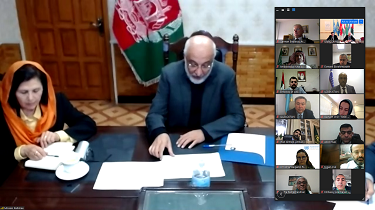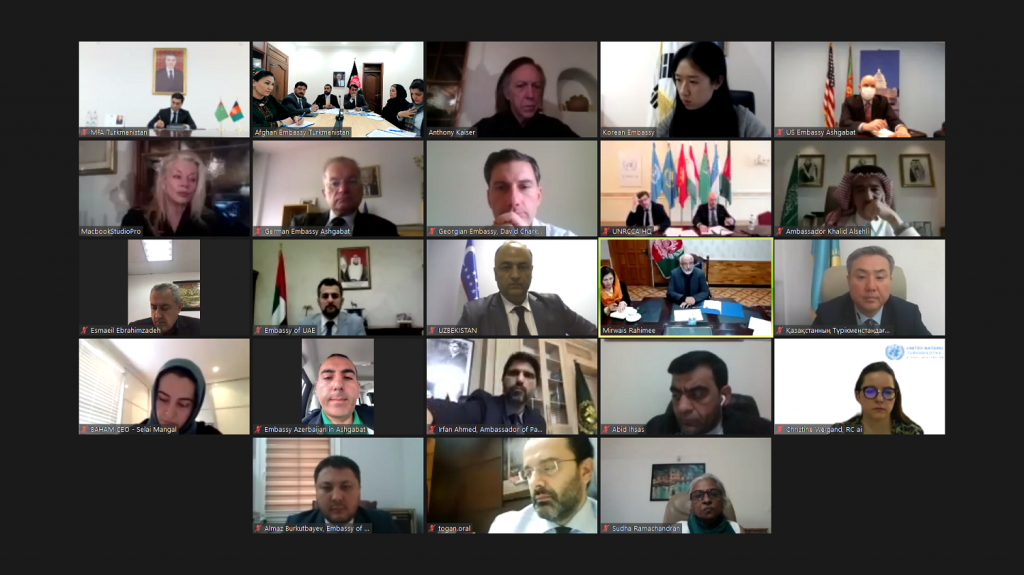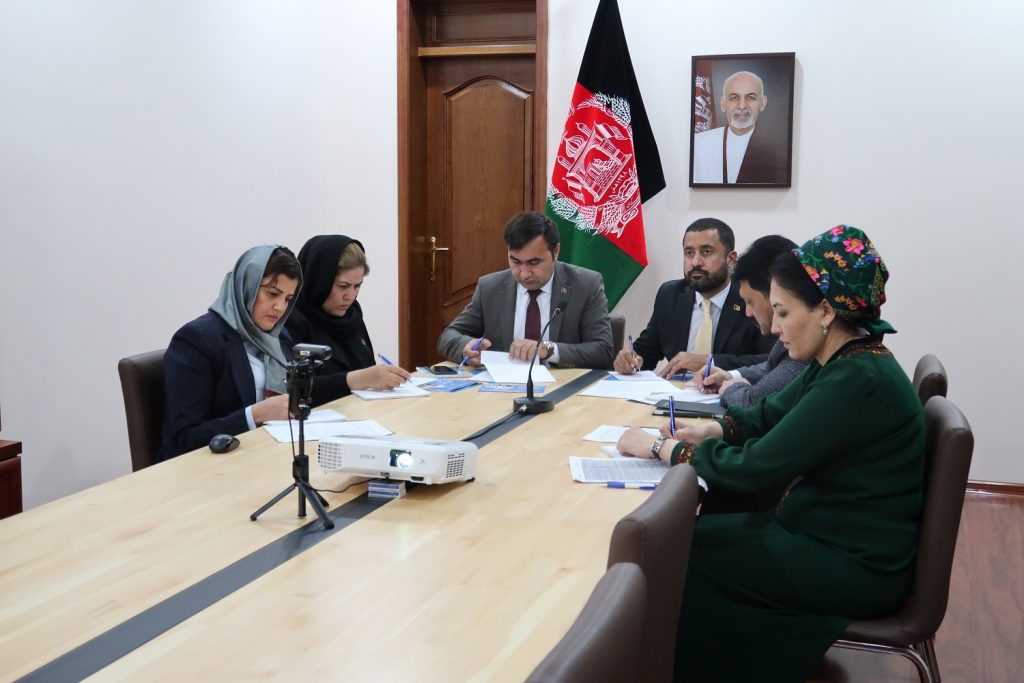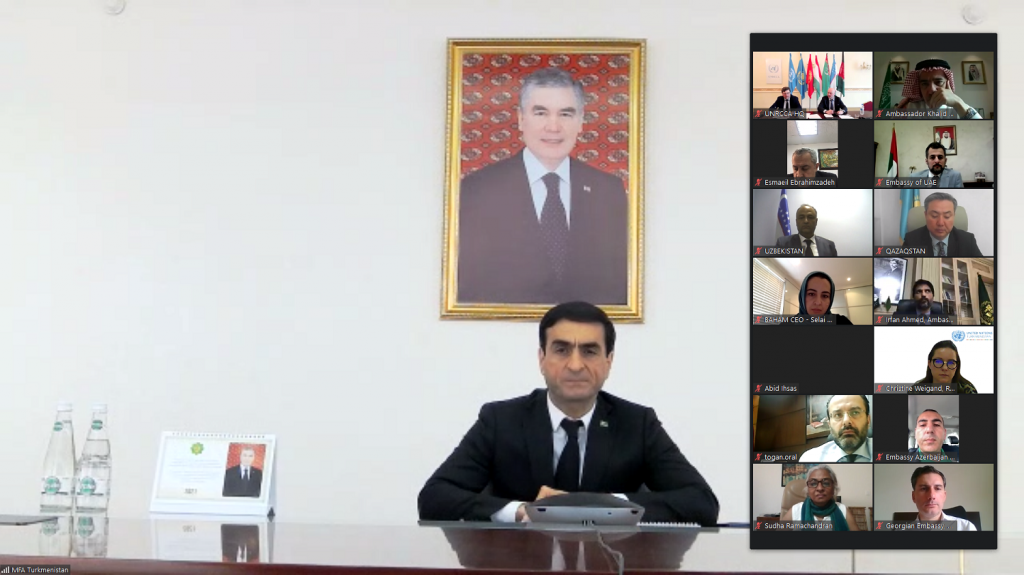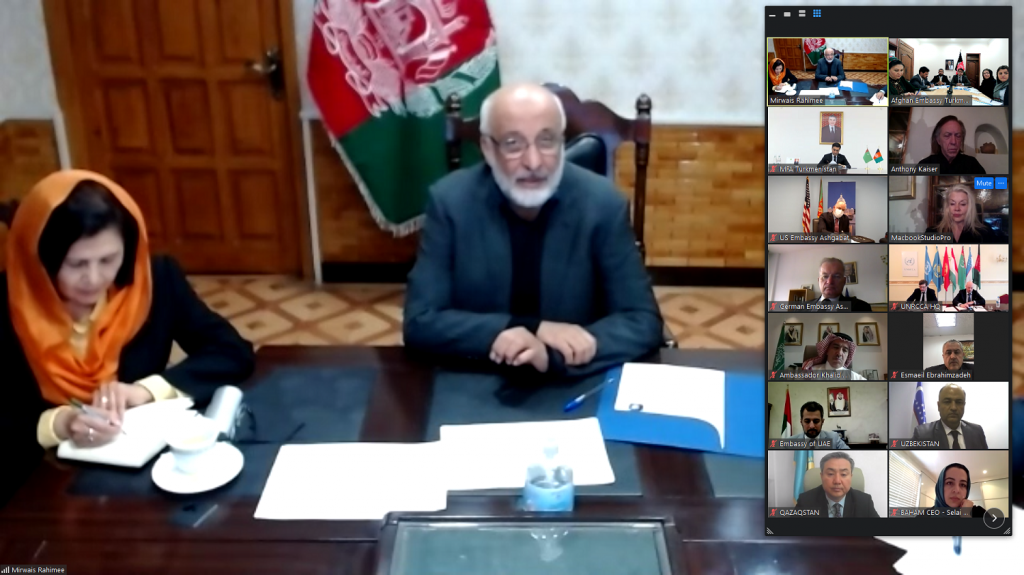nCa News and Commentary
The Embassy of the Islamic Republic of Afghanistan in Ashgabat has hosted a video conference under the title of “Afghanistan Peace Process: Current status, Challenges and Solutions”.
The meeting was opened by Mr. Khan Wali Khan Basharmal, Ambassador of the Islamic Republic of Afghanistan to Turkmenistan.
H.E. Mohammad Masoom Stanekzai the Chief Negotiator of Afghanistan’s Peace Negotiation Team was invited as a key speaker to the conference shed light on Afghanistan’s perspective about the current status, challenges and solutions of the peace process.
Mr. Stanekzai also spoke about the Moscow meeting and Afghanistan’s views and position at peace conference which is going to be held in Turkey in April 2021.
Mr. Wapa Hajiyev, Deputy Minister for Political Affairs of the Ministry of Foreign Affairs of Turkmenistan also spoke about Turkmenistan’s role in Afghanistan’s peace process, emphasizing that his country has always supported Afghanistan’s position in the peace talks and seeks to ensure lasting peace, stability and security in Afghanistan.
In the second part of the video meeting which was moderated by Ahmad Tariq Noorzadeh Counselor of the Embassy, His Excellency Mohammad Masoom Stanekzai answered the questions of the participants.
The meeting was attended by 43 participants including Ambassadors from Central Asia and the Caucasus, a number of European countries, Eastern Asia, India, Pakistan, Iran, United States and Russia, and heads of international organizations including the United Nation’s Center for Preventive Diplomacy, United Nations Coordination Office in Ashgabat and country Director of UNICEF, OSCE, World Bank, USAID and others.
In the mentioned meeting a large number of national and foreign journalists as well as foreign writers and scholars also participated.
This meeting was initiated by the Embassy of I.R. Afghanistan in Ashgabat, provided an important opportunity for the diplomatic community in Turkmenistan to receive a clear picture of the latest developments in the Afghan Peace Process and the challenges it faces.
In addition, solutions that the Afghan Government believes could lead to lasting peace, security and stability were presented. /// Embassy of Afghanistan in Ashgabat, 25 March 2021
nCa Commentary by Tariq Saeedi
The inconvenient but undeniable fact is that the only legitimate stakeholders in any country are the people of that country.
For instance, if some outsider goes to Paris, or Brussels, or Washington DC and proclaims that they are the stakeholders and must determine the direction of major decisions involving the fate of France, Belgium, or the USA, what will likely happen — In the best case scenario they will be laughed out of town but more likely they will be tarred and feathered out of town.
This brings us back to the concept of sovereignty.
One of the definitions of sovereignty is ‘supreme and independent power or authority in government as possessed or claimed by a state or community.’
As such, everyone who considers themselves some kind of stakeholder in Afghanistan must primarily contribute to strengthening the sovereignty of Afghanistan. That is the only rightful role for an outsider: to enable the people of Afghanistan to exercise their sovereignty.
The videoconference organized by the Afghan embassy in Ashgabat on 25 March 2021 gently underlines this fact.
There is also the question of rights and responsibilities.
Peace in Afghanistan, as anywhere else in the world, is simultaneously the right and the responsibility of its people. It is for the world to facilitate the people of Afghanistan to exercise this right and responsibility.
It is also the litmus test. Do the words and deeds of outsiders match when they talk of peace in Afghanistan?
There is a related question that is only conceptual now – a germ of an idea – but could possibly take shape when Afghanistan has reinforced its sovereignty: Will it be appropriate to demand war reparations from the invaders?
Whether this question ever comes up or not is not relevant here. What is directly relevant is the need to find ways to bolster the economy of Afghanistan so that it can exercise its sovereignty.
There is the universal recognition, inside and outside Afghanistan, that the economy of this war torn country needs urgent attention. Peace in Afghanistan is also dependent on the state of economy of Afghanistan.
What is the shortest route to the economic recovery of Afghanistan, spreading the benefits to the grassroots level? — Tapping the transit and transport potential of Afghanistan.
One of the most important set of projects in this direction is the TAPI Corridor, combining a gas pipeline, the fiber optic link, the road, the railway line, and the power transmission network across the territory of Afghanistan, linking the suppliers in Central Asia to the consumers in South Asia and vice versa.
Turkmenistan has been pushing the elements of this corridor for more than a couple of decades and the things are moving satisfactorily now.
Ambassador Basharmal, the Afghan envoy in Turkmenistan, and Counselor Noorzadeh of the Afghan embassy here are working energetically to build bridges and maintain transparent communication channels.
The pieces of fragmented peace are coming together now, bit by bit, little by little.
It would be admirable to hold a round of dialogue in Turkmenistan, a country that has proven credentials as a peace maker. It is one of the best sited places for the intra-Afghan dialogue. /// nCa, 26 March 2021
